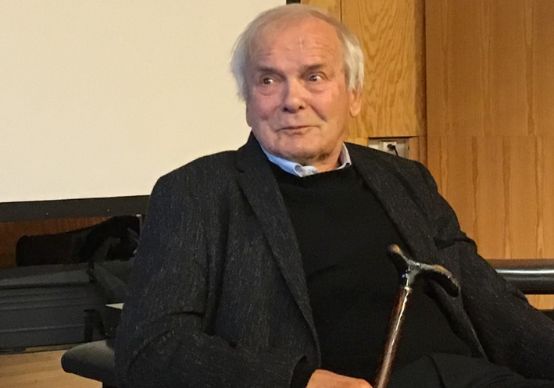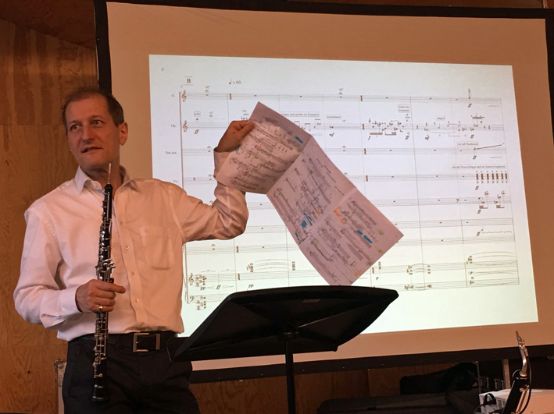Vinko Globokar's work under the microscope
With a symposium, three concerts and two workshops, the Zurich University of the Arts dedicated an extensive focus to Vinko Globokar, who was born in 1934.

Hardly noticed by the general music public, the Zurich University of the Arts (ZHdK) regularly organizes prominent conferences on composers who have shaped modern music and who, ideally, are also guests themselves. The symposium in the presence of Vinko Globokar followed on from conferences on Alvin Lucier, Jannis Xenakis and Gérard Grisey and once again brought together a group of profound connoisseurs and confidants of the composer.
"It's all coincidence," said Vinko Globokar in conversation with Jörn Peter Hiekel, director of the symposium, and Jens Schubbe, artistic director of the Collegium Novum Zurich, about his career. The humorous tone and lightness of touch were surprising. Globokar, a composer, trombonist and improviser, is immediately associated with archaic physical strength or political and social impetus. As a fundamentally political person, he consistently questions the institutional structure of the classical music business, the concert format and the hierarchies of the classical music system in his compositions. Central aspects here are the relationship between body and instrument, composition and improvisation or individual and group. Legendary works such as Corporel (1985) or Res/As/Ex/Inspirer (1973) are devoted entirely to the body or the breath and take performers to the limits of their capabilities.
Globokar likes to quote his close composer friend Heinz Holliger's description that "as a composer, he is like an architect who constructs complicated buildings and at the same time lays bombs to destroy them again". Max Nyffeler (Munich) related this in his symposium contribution and concluded: "Building a precarious situation that can collapse at any time runs through his entire oeuvre." He also emphasized that Globokar's composing is never about exclusive knowledge, but that he composes "inclusively". Many of his works call for participation. Consequently, he is always present during rehearsals wherever possible, for example during rehearsals for Discours II for five trombones, whose performance by ZHdK students set the mood for the symposium.
Instruments as an extension of the body
Jörn Peter Hiekel emphasized Globokar's significance for contemporary music in terms of his world-relatedness towards cultural and political events. This manifests itself in anarchic power, performativity, the inclusion of space or in the essential contribution to the relationship between composition and improvisation. Sabine Beck (Frankfurt) then went into more detail about this interplay between composition and improvisation. A time factor and an action factor are decisive for the methodological distinction: in improvisation, one decides on the procedure at the same time, in composition, the decisions are made beforehand. Globokar said of the improvisation ensemble he co-founded in 1969 New Phonic Art"Everything that happens now happens on stage; we don't talk about it beforehand, we don't talk about it afterwards." According to Beck, Globokar needs a holistic, self-responsible type of musician who is always also a singer and performer and critically examines the concept of music and society. Finally, Matthias Arter on the lupophone and Vladimir Blagojevic on the accordion gave a lecture performance based on excerpts from Septuor par treize sources (2017) presents Globokar with specific challenges for the performers. Globokar's latest chamber music piece, which was performed at the pre-art soloists' evening concert, dispenses entirely with improvisation, demands full performative commitment and uses the instruments almost as an extension of the body.
-

- Photo: Max Nyffeler
- Matthias Arter at the lecture performance
At the Collegium Novum Zurich concert the evening before, which Globokar presented alongside Mauricio Kagel and Bernd Alois Zimmermann, even somewhat older pieces seemed surprisingly contemporary. In Dialogue about earth for solo percussion (1994), for example, congenially interpreted by Julien Mégroz, is all about water. All kinds of rattles are heard outside and inside a transparent Plexiglas container filled with water, whereby the resonance of various elements is brought before the eyes and ears both visually and sonically, undermining the expectations associated with the title. In La Prison for eight instruments (2001), on the other hand, Globokar uses grill grates as sound bodies that are visually reminiscent of prison bars. He does not allow the performers to play a single "normal" note appropriate to their instrument. "A piece like La Prison rejects all conventional criteria such as beauty of sound and sound organization," Schubbe said.
"It's the first time that someone has looked at my work with a magnifying glass. I was always happy that some friends found what I do interesting," Globokar said jokingly at the end of the symposium. There is a hint of truth in his subtle humor. His importance for the musical avant-garde has often been acknowledged. However, the ZHdK event is unparalleled in terms of both scope and depth.







